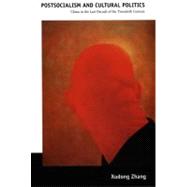
Note: Supplemental materials are not guaranteed with Rental or Used book purchases.
Purchase Benefits
Looking to rent a book? Rent Postsocialism and Cultural Politics [ISBN: 9780822342304] for the semester, quarter, and short term or search our site for other textbooks by Zhang, Xudong. Renting a textbook can save you up to 90% from the cost of buying.
| Acknowledgments | p. ix |
| Introduction: The Cultural Politics of Postsocialism | p. 1 |
| Intellectual Discourse: National and Global Determinations | |
| The Return of the Political: The Making of the Post-Tiananmen Intellectual Field | p. 25 |
| Nationalism, Mass Culture, and Intellectual Strategies in the 1990s | p. 102 |
| Postmodernism and Postsocialist Society: Cultural Politics after the "New Era" | p. 136 |
| Literary Discourse: Narrative Possibilities of Postsocialism | |
| Shanghai Nostalgia: Mourning and Allegory in Wang Anyi's Literary Production in the 1990s | p. 181 |
| Toward a Critical Iconography: Shanghai, "Minor Literature," and the Unmaking of a Modern Chinese Mythology | p. 212 |
| "Demonic Realism" and the "Socialist Market Economy": Language Game, Natural History, and Social Allegory in Mo Yan's The Republic of Wine | p. 240 |
| Cinematic Discourse: Universality, Singularity, and the Everyday World | |
| National Trauma, Global Allegory: Construction of Collective Memory in Tian Zhuangzhuang's The Blue Kite | p. 269 |
| Narrative, Culture, and Legitimacy: Repetition and Singularity in Zhang Yimou's The Story of Qiu Ju | p. 289 |
| Notes | p. 311 |
| Bibliography | p. 331 |
| Index | p. 341 |
| Table of Contents provided by Ingram. All Rights Reserved. |
The New copy of this book will include any supplemental materials advertised. Please check the title of the book to determine if it should include any access cards, study guides, lab manuals, CDs, etc.
The Used, Rental and eBook copies of this book are not guaranteed to include any supplemental materials. Typically, only the book itself is included. This is true even if the title states it includes any access cards, study guides, lab manuals, CDs, etc.